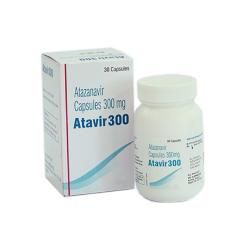Description
Atazanavir 300 mg Capsule is in the protease inhibitor (PI) class of HIV-1 therapeutic drugs, used for treating human immunodeficiency virus (HIV-1) infection, in combination with other antiretroviral agents, for patients aged 3 months and older, weighing 5 or more kilograms.
Dosage and Side Effects
The recommended dosage for treatment-naive patients is Atazanavir 300 mg with ritonavir 100 mg once daily with food or Atazanavir 400 mg once daily with food. When coadministered with tenofovir, the recommended dose is Atazanavir 300 mg with ritonavir 100 mg.
The recommended dosage for treatment-experienced patients is Atazanavir 300 mg with ritonavir 100 mg once daily with food. Dosage for pediatric patients (aged 6 to less than 18 years) is based on body weight not to exceed the adult dose.
The most common side effects of Atazanavir 300 mg are abdominal pain, nausea, jaundice, depression, rash, headache, peripheral neurologic symptoms, dizziness, vomiting, insomnia, myalgia, diarrhea, and fever.
FAQ's
What is Atavir 300?
Atavir 300 is a generic of Reyataz that contains Atazanavir as the main component. This drug is used for the treatment of HIV-1 infection, in combination with other antiretroviral agents.
Who has launched the generic Atavir 300?
Natco Pharma Ltd has launched the generic Atavir 300, as 300 mg capsules for oral administration.
How do I take Atazanavir?
The recommended dosage of Atazanavir capsules is taken with food once daily with a pharmacokinetic booster.
How do I store Atazanavir?
Store atazanavir capsules at 25°C (77°F); excursions permitted to 15 to 30 °C (59 to 86 °F).
How much does Atazanavir cost in India?
Atazanavir 300 mg cost in India is very reasonable and can vary. To procure it legally, you can call us at (+91) 8130290915, TOLL-FREE: 1800-889-1064, Or Write us at info@indiangenericmedicines.com.
Where can I get Atazanavir at the best Price?
Order Atazanavir capsule at the best price today. We request you to Call/WhatsApp us at (+91) 8130290915 or dial our TOLL-FREE Number: 1800-889-1064 or Write us at info@indiangenericmedicines.com. We’re fully committed to providing you with the best Atazanavir 300 mg price from India. That is why we’ll match the cost/price of any other existing suppliers/distributors in the market who require a medical prescription.
Is the Atazanavir available in India?
Atazanavir capsule is a (prescription drug, doctor-prescribed medication, or health care professional-prescribed medicine) pharmaceutical drug that can be legally dispensed against a medical prescription. Atazanavir can be made available through the network of authorized distributors in India. (Ahmedabad, Mumbai, Kolkata, Hyderabad, Chennai, Delhi, Pune, Bangalore, etc.).
Can You Send the Atazanavir to Foreign Destinations?
Buy generic Atazanavir capsule online at the best/lowest price from a leading supplier. Indian Generic Medicines can assist in the delivery of Atazanavir; the doctor-prescribed medication to the UK, Canada, Australia, Philippines, the USA, Saudi Arabia, Thailand, China, South Africa, Pakistan, Kuwait, Sri Lanka, Afghanistan, Sweden, Kazakhstan, Uzbekistan, Zambia, Hong Kong, Turkey, Malaysia, Singapore, Qatar, Japan, Nepal, UAE, and many other countries.
What is the procedure for buying Atazanavir from Indian Generic Medicines?
Patients can fill out the order form or send mail to info@indiangenericmedicines.com. Patients can also send WhatsApp messages to +91 8130290915 or can dial the TOLL-FREE Number: 18008891064. We will reply ASAP with the details of the Atazanavir 300 mg price as well as the procurement procedure.
Note:- The order will be confirmed only after the valid receipt of the prescription from the Physician.
Is it safe to buy Atazanavir online from India?
Yes, one can buy Atazanavir 300 mg online from India-based Indian Generic Medicines if it is not (yet) registered or is unavailable in their respective country. We can facilitate the supply of Atazanavir capsules through legal channels.






